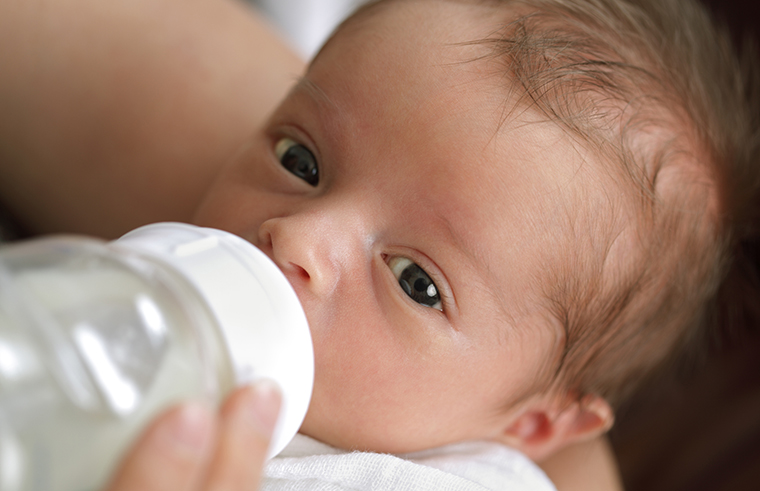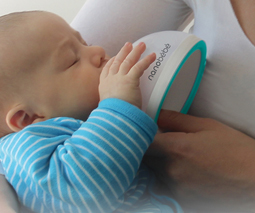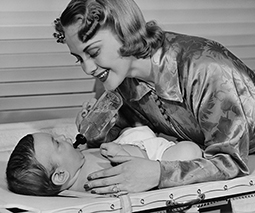My baby was refusing the breast (and it was making me cry)

As I sit, I close my eyes and breathe in and out slowly. I try to loosen my shoulders, which are tense and like “cement” according to my massage therapist. I remind myself to relax, as I know tension will further thwart my mission. No, I am not sitting down to mediate. I am sitting down to feed my four-month-old baby girl. And this is our pre-feeding ritual.
There is nothing relaxed and enjoyable about it. Even before I have unclipped my bra, she arches her back and turns her distressed, writhing body away from me. I try to coax her gently back by rocking, patting and humming, but she won’t have a bar of it. Her eyes fill with terror and she wails and thrashes as she pulls off my nipple, almost tearing it to shreds. I persist, but she resists – and ultimately we both end up in tears.
This is what it’s like to experience breast refusal. This is what it’s like to have your baby reject you. And it’s awful. At this point I run to the kitchen and frantically fix a bottle of expressed breast milk for her, which she guzzles down in exhausted relief. I am expressing up to six times a day to maintain my supply, but each time I see her gulp from the bottle, part of me weeps. To not be able to feed your baby is as soul destroying as it is stressful.
What is breast refusal?
Breast refusal, sometimes referred to as a “nursing strike”, can happen at any time and last anywhere from a few days to a few weeks – or longer, in my case. There are many possible reasons for it, including illness, teething, immunisations, attachment problems, overtiredness, nipple confusion, and a change in feeding patterns. Sometimes no reason can be found. And sometimes it can all be over as quickly as it began. Or not.
I don’t think there’s anything quite as distressing as watching your (hungry) baby wail and refuse to feed. It is the ultimate rejection. Of course, it’s not personal, but it certainly feels that way, especially when the chorus of “breast is best” echoes everywhere. From the beginning, we have struggled with attachment issues, blistered nipples and incomplete feeds. But we have persevered. Though it hasn’t been easy, we have managed, until a month ago when she moved from fussy to flat out refusal.
Breast refusal is hell. It is an emotionally complex experience fuelled by self-interrogation. Is it something I’ve eaten? Is my supply dropping? Is my flow too fast? Too slow? Is this position wrong? Why does she hate my boobs? And in the worst moments – Why doesn’t my baby like me?
Like everything in parenting, advice is plentiful and conflicting. “Just switch to the bottle” is a common response, but not particularly helpful when you so passionately want to breastfeed.
What can be done?
I hoped my baby’s breast refusal would pass in a few days, but it got worse. It got so bad that most feeds were abandoned. I tried everything the parenting experts suggested. I got nude, encouraging skin-to-skin contact. I tried feeding lying down. I tried standing up. I tried when she was awake, and when she was asleep. I tried feeding in the bath. And, I tried relaxing; the hardest of all when you’re faced with such a situation.
Aside from the stress of not being able to feed your baby, and hearing those haunting words “failure to thrive”, is the social isolation that comes with breast refusal. Over the past month I have only left the house when absolutely necessary – to drop my other kids to and from school. There are no outings with other mums and bubs at parks or cafes. I cannot be out in public when it is time to feed. This is not only isolating but stressful, too.
I spend my days mentally rehearsing how and when I am going to feed my baby. By the end of the day I am so physically and emotionally drained, I can barely function. But even after the dinner is done, kids are bathed and books are read, I still get out my double pump to express.
Post-script: Perseverance is key
It took my third Lactation Consultant to perform a thorough oral assessment of my baby. We finally discovered she has a posterior tongue-tie and upper lip tie, making a comfortable attachment virtually impossible. She has since undergone a frenectomy (surgical revision of the frenum) and we are two weeks post-procedure.
Releasing her ties has made a difference to our feeds. It’s still not easy, but she is no longer fighting at my breast. My shoulders have relaxed and she is willing to begin at the breast and be topped up with a bottle. I hope we can get her back to the boob full-time soon.
I treasure the feeds that go well, because when she’s relaxed at my breast there really is no greater feeling in the world.
 Need some more feeding advice? Our Parent School lactation experts can help. Click to find out more or book a one-on-one session.
Need some more feeding advice? Our Parent School lactation experts can help. Click to find out more or book a one-on-one session.













